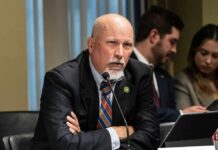
In a rare media interview — with that hard-hitting investigative outlet The Weather Channel — Joe Biden enthusiastically endorsed a proposition that migrants should be allowed entry into the United States if their native lands suffer from “extreme weather events.” When questioned about America’s responsibility in this situation, Biden stated, “Look, I think the United States should do everything it can to help people who are in desperate need and have no other means of help. And we’ve always done that. It is just who we are.”
But as the influx of migrants continues, one has to question: Is this only another chapter in the story of Biden’s “open borders disaster” for America? Business groups seek to bring impoverished individuals to the U.S. and Europe, seeing them as potential consumers, renters, and low-wage workers. Moreover, there’s the assertion that “climate refugees,” born from the circumstances of climate change, should seamlessly integrate into American society instead of investing in the progress of their native countries.
"Biden promises aid for ‘Climate Migrants‘ in Weather Channel interview."
Did ya know the Illegal Migrants flooding our borders are part of Climate Change? Good God!! 🙄🤭https://t.co/nHexydLEul— Jill (@Jillcypfedeli) August 10, 2023
The international think tank IEP forecasts predict that “1.2 billion people could be displaced globally by 2050 due to climate change and natural disasters.” Yet, what’s disconcerting is Biden’s record of importing about six million migrants for economic gains in less than three years. This strategy inflates real estate prices while deflating Americans’ salaries.
Moreover, Biden’s communication style continues to underwhelm. When the president claimed he declared a national emergency on climate change, it took White House press secretary Karine Jean-Pierre to clarify that he was referring to invoking the Defense Production Act for clean energy production in 2022. But, even then, why hasn’t a formal national emergency been declared, considering the administration’s alleged commitment to the climate issue?
"Is it the responsibility of the U.S. to protect migrants who might be fleeing extreme weather in their countries?"
Biden: "We're replacing every single lead pipe in America!" pic.twitter.com/LYEjmsTLJ0
— RNC Research (@RNCResearch) August 9, 2023
This isn’t the first time the Biden administration’s decisions regarding climate and energy have faced scrutiny. The Edison Electric Institute (EEI) has recently expressed reservations about the Biden administration’s proposed climate regulations for power plants. They argue that the technology backing the emission cuts, namely carbon capture and hydrogen energy, is “not deployable, available, or affordable across the entirety of the industry.”
The designation of land around the Grand Canyon as a national monument, effectively banning future uranium mining, raised concerns among industry groups. This area, rich in valuable uranium resources crucial for zero-carbon nuclear power, sees most of its domestic production from the Colorado Plateau region. Blocking access to this resource could adversely affect America’s energy and economic landscape.



























